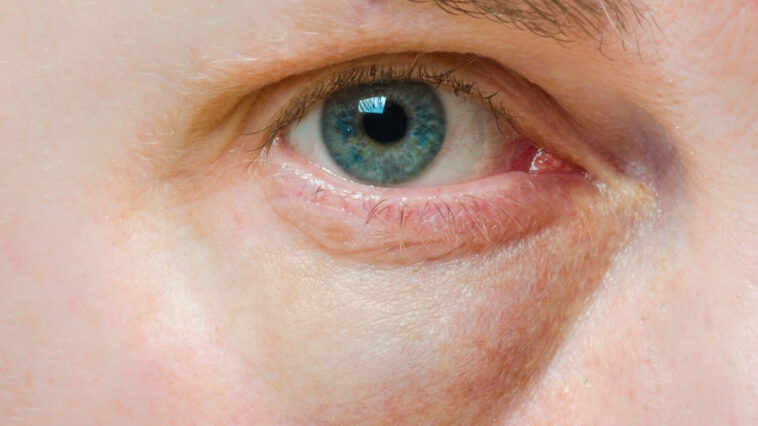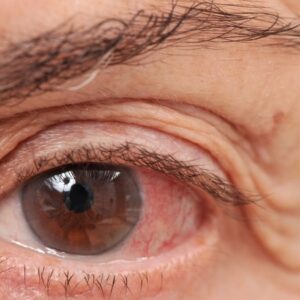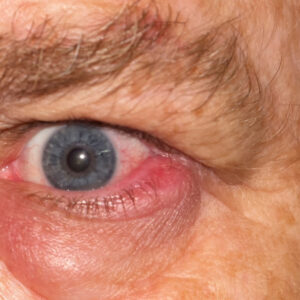What is Puffy Eyes?
Puffy eyes are a common condition in which the skin around the eyes appears swollen or distended. Various factors, including fluid retention, allergies, and aging, can cause this.
Puffy eyes can also result from sleep deprivation, alcohol consumption, and certain medical conditions. Some people may be more prone to developing puffy eyes due to genetic factors.
Puffy eyes can be temporary or chronic; sometimes, they may signify a more serious underlying health issue. If you are concerned about puffy eyes, consult your eye doctor. They can help determine the cause of your puffy eyes and recommend the appropriate treatment.
What Causes Puffy Eyes?
There are many potential causes of puffy eyes, including:
- Fluid retention: Fluid can accumulate around the eyes and cause them to appear puffy. This is often caused by changes in hormone levels or a high-salt diet.
- Allergies: Allergic reactions can cause the eyes to become itchy and swollen.
- Aging: As we age, the skin around the eyes becomes thinner and more prone to puffiness.
- Sleep deprivation: Not getting enough sleep can cause the skin around the eyes to become puffy.
- Alcohol consumption: Drinking alcohol can cause fluid to build up around the eyes and lead to puffiness.
- Medical conditions: Certain conditions, such as thyroid issues and kidney disease, can cause puffy eyes.
Sometimes, puffy eyes may signify a more serious underlying health issue, so you must speak with a healthcare provider if you are concerned. They can help determine the cause of your puffy eyes and recommend the appropriate treatment.
Why Do You Wake up With Puffy Eyes In the Morning?
Allergies: Allergies can cause inflammation and swelling, leading to puffy eyes. You might wake up with puffy eyes in the morning for several reasons. Here are some possible causes:
Aging: As we age, the skin around our eyes becomes thinner and loses elasticity, which can cause puffiness.
Dehydration: If you are dehydrated, your body may retain water, which can cause puffiness in your face, including around your eyes.
Sodium intake: A high intake of sodium can cause your body to retain water, which can lead to puffiness.
Alcohol consumption: Alcohol can cause your body to retain water and lead to puffiness.
Lack of sleep: Not getting enough can cause puffiness around the eyes.
Hormonal changes: Hormonal fluctuations during menstruation or pregnancy can cause puffiness.
Sun exposure: can cause swelling and inflammation, leading to puffy eyes.
Genetics: Puffy eyes can be hereditary, so you may be more prone to them if other family members have them.
10 Ways to Get Rid of Puffy Eyes
Several ways to get rid of puffy eyes, including the following:
Address your allergies
For those with puffy eyes, allergies could be a significant contributing factor. Common signs of allergies include reddened eyes and swelling, which can lead to further puffiness. Consult your eye doctor if you have year-round or seasonal allergies, as they can help you manage the underlying cause of your eye puffiness.
Get Plenty of Sleep
Ensuring a good amount of restful sleep can go a long way in reducing puffiness around the eyes. Not getting the recommended seven-eight hours of sleep each night can lead to fatigue, which increases excess fluid buildup and causes puffiness.
Avoid alcohol
Alcohol consumption should be reduced or avoided to help prevent and reduce eye puffiness. Alcohol can cause dehydration, which in turn can lead to water retention and result in puffy eyes.
Compared to other sources of hydration, such as water or herbal tea, cutting down on your alcohol consumption can help to alleviate puffy eyes.
Use a cool compress
If you have puffy eyes, applying a cold compress is one of the easiest and most effective home remedies. Place a cool cloth or towel over your eyelids for 10-15 minutes, reducing inflammation and relieving puffiness.
Avoid Salty Foods
Eating salty foods can lead to your body retaining water, which can cause puffiness or bags around your eyes. Avoiding salty snacks and opting for healthier alternatives minimizes puffy eyes. Salty chips, crackers, and processed foods should be limited or avoided to keep your eyes looking their best!
Drink Plenty of Water
Puffy eyes are a common symptom of water retention and dehydration, so stay hydrated by drinking plenty of water. Water helps flush out toxins that can build up in the body, leaving you with less puffiness around the eye area.
Eat Enough Potassium
Potassium has several properties that make it beneficial when dealing with water retention and is known to regulate fluid balance throughout the body.
Eating foods high in potassium can help reduce the appearance of puffy eyes. Incorporating bananas, spinach, yogurt, avocados, sweet potatoes, and kale into your meals is easy to increase your daily potassium intake.
Prop yourself up
If you want to reduce the puffiness in your eyes, one of the best tips is to prop yourself up with an extra pillow while you sleep. Sleeping on your back will help reduce swelling and puffiness by ensuring the area around the eye has adequate drainage during the night.
User an Eye Cream
Eye Cream can help reduce puffiness and dark circles in the eye area. Regularly applying Eye Cream can help decrease inflammation, boost hydration, and nourish the delicate skin around your eyes.
It also helps to protect against environmental aggressors such as dust, pollution, and blue light from digital devices. Eye Cream is a great way to keep your eyes looking their best!
Cosmetic Surgery
Blepharoplasty is the most common type of cosmetic surgery designed to address this problem, known as an eyelid lift. This procedure involves removing sagging skin and excess fatty tissue around the eyes to give them a youthful appearance. In some cases, laser resurfacing treatments may also be recommended for treating puffy eyes.
It’s important to note that if your puffy eyes are accompanied by other symptoms, such as redness, itching, or discharge, you must consult an eye doctor to determine the cause and appropriate treatment.
When to See An Ophthalmologist
It’s generally not necessary to see an ophthalmologist for mild puffiness around the eyes that can be quickly relieved with home remedies.
However, you may want to see an eye doctor if:
- The puffiness is severe or doesn’t go away after trying home remedies
- You experience other symptoms, such as redness, pain, or vision changes
- You have a history of allergies or other medical conditions that may be causing the puffiness
If you’re concerned about puffiness around your eyes, you must speak with an eye doctor for proper evaluation and treatment.






